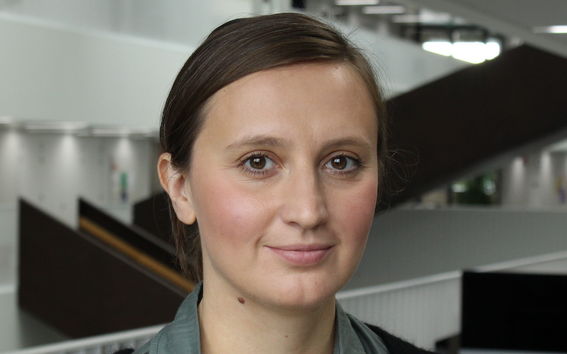Natalia Särmäkari: ‘Digital fashion is changing the ideals of designership’

What is your research about?
‘In my thesis, I explore how contemporary technological environments and their rapid change affect the work, authorship and professionalism of fashion designers. The profession of fashion design has always been linked to technology, and I want to look at what it is now and in the future, in the era of digital fashion.
I have chosen four case studies that share the use of smart technology and a desire to actively change the traditional ways of doing fashion design. I chose small, progressive companies that have since been followed by larger fashion houses: The Fabricant (Amsterdam), Atacac (Gothenburg), Matti Liimatainen / Self-Assembly (Helsinki) and Minuju (Helsinki).
I also look at three phenomena that are central in current technological landscape that I refer to as “fashion 4.0”. One of them is the open-source philosophy, i.e. the sharing of knowledge and skills, challenging the closed ways of doing things in the fashion world. The second phenomenon is digital fashion, which stands for the use of 3D technologies in designing and presenting clothing or entire fashion experiences. It can refer to the 'digital twins' of physical clothing, but also to the new strong link between fashion culture and the worlds of games, virtuality and blockchain technologies. For example, one of my case studies, The Fabricant, created the first ever digital-only dress that was turned into an NFT (non-fungible token) - an authenticated and unique digital asset. The third phenomenon I'm exploring is algorithmic fashion design, where design relies on the potential of artificial intelligence as a source of inspiration or to optimise the structure of a garment, for example.’
What is important in it?
‘My own interest in the subject started when, as a fashion designer, I realised that the industry needed to change its outdated processes and solve its problems. I was haunted by mass production, sustainability problems and the power of the marketing machine. I think that fashion designers have experienced professional crisis for a long time and designers are seeking new prospects. It's not just a question of renewing tools and materials, but a whole fashion culture is looking for an alternative way of thinking. We need a system where supply and demand are better balanced, where people can directly influence what is produced, and where the latest technologies are used for on-demand production.'
Natalia SärmäkariIt's not just a question of renewing tools and materials, but a whole fashion culture is looking for an alternative way of thinking."
'A new social group has emerged in the industry, digital fashion designers, who share their creativity with others – not just professionals, but all people. They are also deliberately challenging traditions and old ways of working. I wanted to look at what subversive strategies they use to challenge the traditional models of the profession and how and why they do so.
I argue that digital fashion re-professionalises fashion design by building a new fashion design culture that draws from the open-source philosophy. These "fashion 4.0 designers" depart from the ideals of the autonomous designer and instead emphasise the role of flexible collaborators whose skills can be adapted to different projects and partnerships. This opens up new, multidisciplinary opportunities for work life and synergies. 3D technology and algorithmic design methods are embraced by these designers. Digital fashion design practice also expands the designer's knowledge and skills. It requires a combination of embodied designer knowledge and digital craftsmanship.’
What can it lead to?
‘My thesis provides new knowledge on what is happening in the fashion field. I have empirically studied cases that no one has studied, looked at their practices and followed their evolution at an important moment in fashion history. I hope that my research will serve other researchers in further research on digital fashion and the fashion design profession.
I believe that my research can also be useful in education. In the future, I will investigate how digital fashion and its possibilities have been incorporated into education and how they can improve the working conditions of designers. Educational aspects also need to be further developed in order for fashion schools to keep up with the rapid pace of technological developments in the industry and the expectations of related skills.’
Natalia Särmäkari's doctoral thesis From a Tool to a Culture: Authorship and Professionalism of Fashion 4.0 Designers in Contemporary Digital Environments will be examined at Aalto University 28 October 2022.
Contact:
Natalia Särmäkari, doctoral researcher, Aalto University School of Arts, Design and Architecture, +358505322018, [email protected]
- Published:
- Updated:
Read more news

Open online courses at Aalto University's School of Arts, Design, and Architecture
Start the new year by learning new skills in design and creativity!
Pengxin Wang: The internship was an adventure filled with incredible research, unforgettable experiences, and lifelong friendships.
Pengxin Wang’s AScI internship advanced AI research, fostered global friendships, and inspired his journey toward trustworthy AI solutions.
Major grant from the Kone Foundation for modern architecture research - Laura Berger's project equates building loss with biodiversity loss
Aalto University postdoctoral researcher Laura Berger and her team have been awarded a 541 400 euro grant from the Kone Foundation to study the effects of building loss on society and the environment.